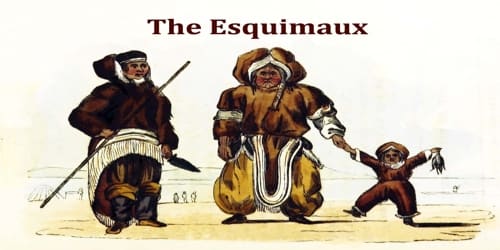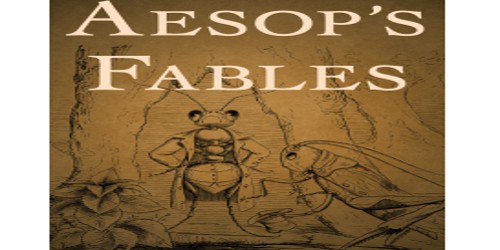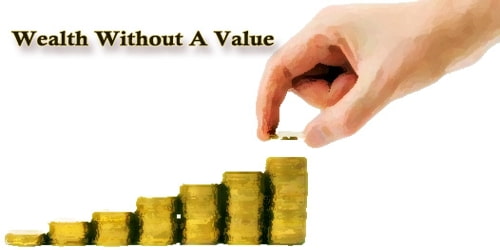When winter comes, we think it necessary to have a good, tight, warm house to keep out the cold and make us comfortable. The dwelling of the Esquimaux is built of blocks of clear ice cemented together by pouring melted snow between them, and a thinner one is inserted for a window to let in light, not to see through. The beds are made of moss and the soft fur skins of the polar bear. Long ropes of sinews stretched overhead to form a place to put their clothing and weapons for hunting and fishing. Their only fire is a stone lamp with whale-oil and twisted moss for a wick. This does not afford enough heat to melt the ice walls. Over the lamp, they slightly cook their bear and walrus meat. Sometimes food is so scarce that, when a hunt has been successful, they will tear off strips of flesh and devour it raw.
An Esquimaux baby or child never knows the taste of candy or sweets as you do; a clean piece of fat is their special treat. They never see a doll, ribbon, laces, toys or picture-books; their only trinkets of adornment are a few beads purchased from voyagers, and these they prize as you would a costly necklace. They never heard of a concert, theater, or May-day picnic; never saw beautiful flowers on tree or grass, and very seldom go visiting, so have few acquaintances. These children know nothing of cake, pie, fruit or nuts, or change of fashions. I don’t suppose they have soap, either.
The mothers carry their babes in something such cradles as Indians use; only the child is wrapped in many furs. An Esquimaux baby has to be very good, for its mother has to sew skins instead of cloth, with a large bone, home-made needle, and sinews for thread, and it must be slow and heavy work, but she does it so neatly that the clothing is water-tight. She also mends the fishing lines, boats, and leather covering of the little pointed boats that sometimes get torn on the floating ice. Only one person can sit in a boat, and he squeezes into that through a place left in the center, sitting so securely that boat and man seem like one.
They travel over the ice in sleds drawn by dogs and go very swiftly. They are not as kind to these useful and faithful creatures as they should be. Many children are ungrateful and unsatisfied with what indulgent parents have provided for them, but they would be sorry to change places with the little Esquimaux. How thankful we should be for the changing seasons of spring, summer, fall, and winter, for all the beauties and bounties they afford, and for the comforts and advantages of civilized life! Whether we possess them or not, much is learned by seeing the productions of wealth, labor, and art. Everyone who makes a beautiful thing or teaches an idea benefits the multitude as well as himself. We should be thankful for the houses of worship and education, and the knowledge that floods the earth through the power of the printing press, all of which is unknown to the little Esquimaux. The poorest child has reason to be thankful that he was not born to dwell in the almost perpetual desolations of snow and ice. Yet they have a sort of enjoyment in their way and do not murmur that their lot is so hard. Perhaps, sometime, God will bring them forth to a better state of existence upon this earth, for they too are his children. I would like to see one of these poor creatures brought from that solitude and taken from one place to another, from the great busy wharves into the wonderful manufactories of cities, the beautiful parks, and the fresh country farms. How I would love to witness their surprise and delight!
















